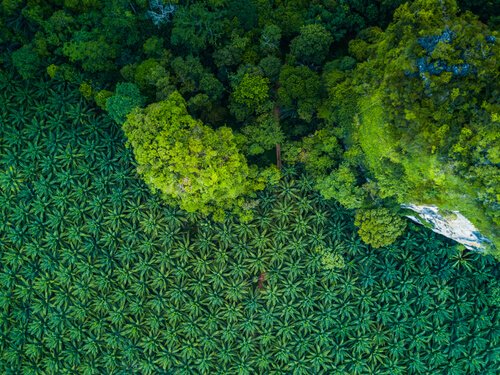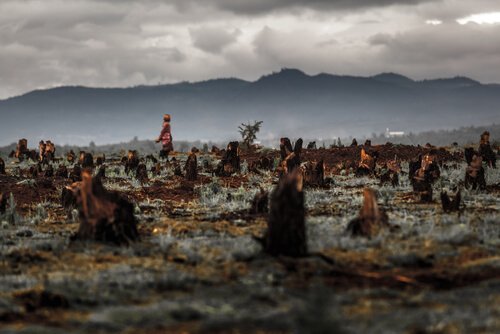Palm Oil Is Also a Threat to Africa


Written and verified by the vet Eugenio Fernández Suárez
Palm oil is a popular ingredient that’s a perfect example of how extremely processed foods can hide ingredients that are harmful to the environment and our health. This oil is famous for causing deforestation in jungles in India and it has made its way to Africa.
The dangers of palm oil
This is the most used vegetable oil in the world. That’s because it’s not only used in food, but also in cosmetic and cleaning products. Palm oil comes from the African palm, however, 85% of the plantations are in Southeast Asia.
The monoculture of palm affects many animals such as new species of orangutan, tigers, and elephants, which has caused an alarming social effect. This is also due to the fact that palm oil can be harmful to human health.
However, palm oil doesn’t just threaten the wildlife of Asian. In recent years, this plant — that’s originally from Africa — has returned to its mother continent in the form of new monocultures in order to supply international demand.
Cultivating this oil consists of burning hundreds of kilometers of forest in order to start the palm monocultures. These linear and arable forests only have one species of plant. Therefore, they have little life because they don’t have any ecological value.

Africa, the next palm oil destination
Society seems increasingly aware of the use of these oils. However, according to recent studies, it will be necessary to quadruple the cultivation area of this product by 2050. This expansion would mainly take place on the African continent. Also, a study from the University of Clark states that the conservation of African primates would be impossible if more palm oil farms start to appear.
In recent months, we’ve seen how commercial interests have affected these animals. News like that of the oldest national park in Africa being open to oil exploration, which makes the future of species like the mountain gorilla frightening.
However, according to this research, almost 200 species of African primates will be affected by palm oil expansion. Interestingly, researchers have found only 9% of the African continent is suitable for farming.

Is it just palm oil?
You should remember that some companies are using other products instead of palm oil. They don’t want to get caught in consumers’ outrage when they see images like those of the orangutans being affected by these crops. However, these oils are often replaced by other unhealthy products that harm the environment. For example, other vegetable oils that also require deforestation.
Processed products contain ingredients that are harmful to African wildlife because they’re masked among dozens of ingredients. However, even meat products or vegetables, like avocados or strawberries, can come from thousands of kilometers away or be threatening to parks.
So, the problem isn’t just with palm oil. If you want your diet to be better for the environment, the best thing to do is find fresh products that are locally grown. This will keep your impact on nature as small as possible. Remember that there are very few things that are just as harmful as consuming palm oil is because burning down forests is required in order to produce it.
All cited sources were thoroughly reviewed by our team to ensure their quality, reliability, currency, and validity. The bibliography of this article was considered reliable and of academic or scientific accuracy.
Strona, G., Stringer, S. D., Vieilledent, G., Szantoi, Z., Garcia-Ulloa, J., & Wich, S. A. (2018). Small room for compromise between oil palm cultivation and primate conservation in Africa. Proceedings of the National Academy of Sciences, 201804775.
This text is provided for informational purposes only and does not replace consultation with a professional. If in doubt, consult your specialist.